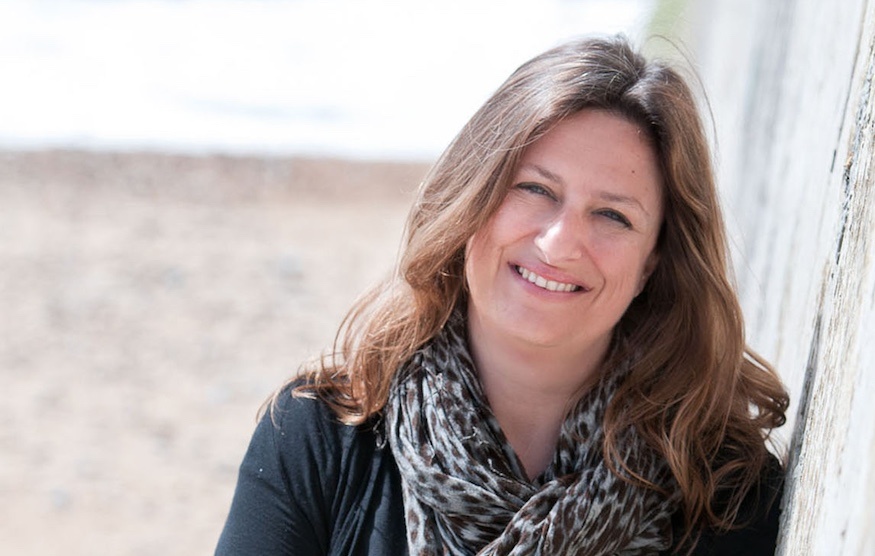
Congratulations to Elly Griffiths. When it’s released on 30 January 2024, The Last Word will be her 30th crime novel. The date is fitting and hopefully, despite the title, this won’t be her last book. As readers, we keep coming back for Griffiths’ vivid characters and settings, canny plotting and humour, which are features across the books she has written. Half her books are from the Dr Ruth Galloway series, set in Norfolk. Then there are her novels set in 1950s Brighton novels. She’s written three more adult reads and four children’s books, plus has five romance titles under her own name, Domenica de Rosa.
Now we have a new standalone, although it’s set in the same milieu as The Stranger Diaries (2018) and The Postscript Murders (2020). With the launch of The Last Word just around the corner, we sat down for a chat with Elly and asked her all about it…
You can order The Last Word here on Amazon.
What are crime fiction lovers going to love about The Last Word?
They will love the fact that The Last Word is about books and people who love books. So it’s three characters from The Postscript Murders – Edwin, Natalka and Benedict – and they’ve set up a detective agency. Local writer Melody Chambers is murdered and they begin to see a pattern when they discover her obituary writer predeceased her. That’s how it starts. It takes them to a writers’ retreat in Battle, near Hastings, and I must say I had a lot of fun with the setting and the idea of a writers’ retreat. I teach writing in a beautiful house in the middle of the countryside so I drew on that. So it’s a book for people who love books and reading.
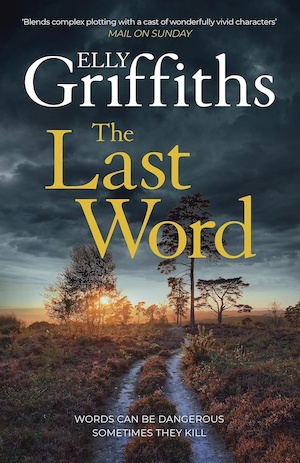
So how do minor characters from The Postscript Murders become the protagonists of this standalone mystery?
It’s funny, isn’t it, because you can have characters in a book that you really like and you enjoy writing about but you kind of know they’re just there for that book and you’re not ever going to go back to them. I suppose when I started The Postscript Murders – with Edwin, who is a retired BBC producer in his 80s; Natalka, a Ukrainian refugee; and Benedict, who runs a coffee shop on the high street in Shoreham – I didn’t really think of them as characters that would come back, but the more I wrote about them the more I wanted to continue with them. Particularly Edwin, I think I just wanted to keep telling his story, I really liked being in his head. I felt that they wanted to set up a detective agency and they could have a book about their first case. Harbinder Kaur from The Postscript Murders is in this book too. She’s now in London so she’s a little bit more detached but she’s still there to give advice.
And Natalka is a Ukrainian refugee, so relevant now. Did you imagine that when you first came up with her?
Goodness! When I invented Natalka I could not have predicted how terribly tragic and relevant this character would be. Maybe I should have. I’m second generation Italian. Immigration is something that’s close to my family. It was actually the subject of my very first book, which is called the Italian Quarter, published under my own name. A friend of mine has a young Ukrainian woman staying, now part of the family, Daria. The book is dedicated to her, the funny thing is Daria has read the novel and she thinks Natalka is quite like her. They’re both beautiful, blonde and studied maths, they’re forthright and both love yoga. It’s one of those very strange writer things– you invent a character and you hope she’s believable then meet someone who’s very like that character. I think Natalka’s character has deepened and become a better character since I’ve known Daria. She’s not Daria of course.
We love your characters, maybe more than the mystery, sometimes. Is that the key for you?
Yes. Character – definitely. Funnily enough I’ve been writing about Wilkie Collins. I’m a huge fan and it was Collins’ 200th birthday this month. He said character and humour are the most important things in writing. I think that’s right. I do think that character is plot. I mean you can have the cleverest plot but if you don’t have characters that people relate to then there’s no tension and suspense. It matters because tension and suspense, which I hope I do rack up a bit in this book, come from caring about what’s going to happen to those characters. I think fiction is great at relationships between people’s chosen families, not blood family. I think in a very real way Edwin, Natalka and Benedict are a chosen family and they do have a very strong connection.
And you represent older characters so positively…
You know I’m 60 now so my characters are around that age, even the younger ones. In this book Edwin is in his 80s and I feel very strongly that we need to represent these characters and, of course, the fact that a character is that old doesn’t mean that they’re infirm or not able to carry out an investigation.
Why is it important to you to temper the darkness in the novel with humour?
Yes, it is a dark story, so you can use humour to underline themes. I have learned as I’ve gone on as a crime writer you can use humour as a deflection from a clue. I’ve noticed a few times that Christie will give you a big clue after a joke or just before a joke. I think in my books, actually, if you were looking for clues you could look for a joke and there might be a clue there.
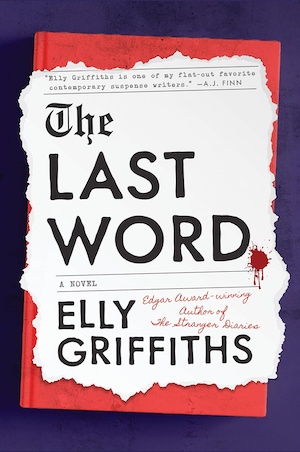
Your writing is sometimes described as cosy. Is that how you see it?
I love dark mythology and folklore and things like that but my good friend Leslie Thompson once said, and this is a really good definition, she thought cosy was how people felt reading some books. For example, if I sit down with an Ann Cleeves book I do feel quite cosy because I know I’m in safe hands. So, that’s a definition I’m happy with.
Do you miss Ruth Galloway?
I’m quite happy to leave Ruth where she is at the moment but I do still think about it as a break. I’m pretty sure I will go back sometime. And there’s the short story collection coming out in June. There are a few Ruth stories and one that carries on from the events of The Last Remains, so you do see forward too.
Fans would love to see Ruth Galloway on TV. Do you think that will happen?
The novels have been optioned again but that’s happened to me now several times so I’ve sort of stopped getting excited about it. I don’t really know why they haven’t made it to the screen, I could be biased but I think they’d be good. TV seems to me a terribly difficult business – you can work hard on a project and then it doesn’t happen. At least writing book you do get to see it published. In one way I’m pleased it hasn’t happened. I’ve been able to finish the Ruth series without them being on TV. When we first optioned I was on book two or three so if that had happened I’m pretty sure I wouldn’t have had the self-discipline not to watch them. All writers are a bit of a sponge. I’m sure I’d have been influenced by the actors they chose and the occasions.
Can you tell us about The Frozen People, your the new project for 2025?
It’s an idea that’s been sort of whizzing around in my head for a while about a time traveling detective. Some people will immediately think, “Oh no, time travel, I’m not going to read that.” Some people might say, “Oh great, I love time travel.” But I do but I think it goes back to what we were saying earlier, that if this is going to work it’s really going to have to be incredibly believable. Life on Mars got me believing in the characters. That was why it was so successful though the plot wasn’t particularly explained. If you can buy into the characters you don’t mind time travel. The first book is going to involve one of my favourite periods in the 19th century and there’s going to be quite a strong sort of political strand too in the present day.
So we know you’re heavily into Wilkie Collins, what about contemporary reads?
Yes, Wilkie Collins because I’ve done these programs with BBC Radio 4 about The Moonstone and No Name, which is one of my absolute favourites, and I’m rereading Armadale, which is absolutely brilliant, and a really extraordinary book called Poor Miss Finch. In some ways Collins has very modern sensibilities and he certainly did believe in women’s rights in a way that maybe is a surprise to us.
Modern writers – Lesley Thompson, her most recent one, which is The Mystery of Yew Tree House, is a very good book because it works in two times lines, half modern day, and has a very good sense of place as well and a very clever murder mystery, so I would definitely recommend that. I really enjoyed Nicci French’s next book Has Anyone Seen Charlotte Salter? I think the title is from the missing person posters they put up. It’s a very good, very sensitive study of a mother who goes missing on the eve of her husband’s 50th birthday party. It’s very atmospheric.
You can order The Last Word here on Amazon.co.uk and here on Amazon.com. Using our affiliate / associates links helps support the site.






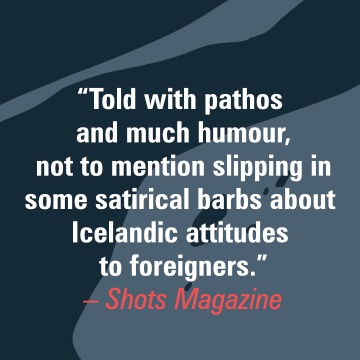
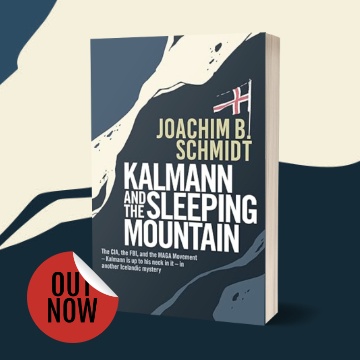
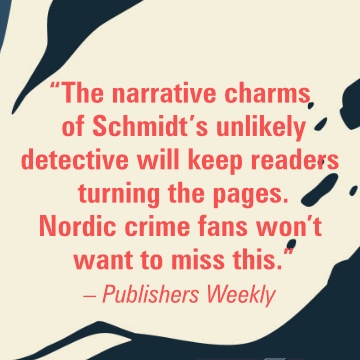
Thank you for the interview with Elly Griffiths. I love all her novels and she is also an inspirational and engaging speaker. I’m looking forward to reading The Last Word!